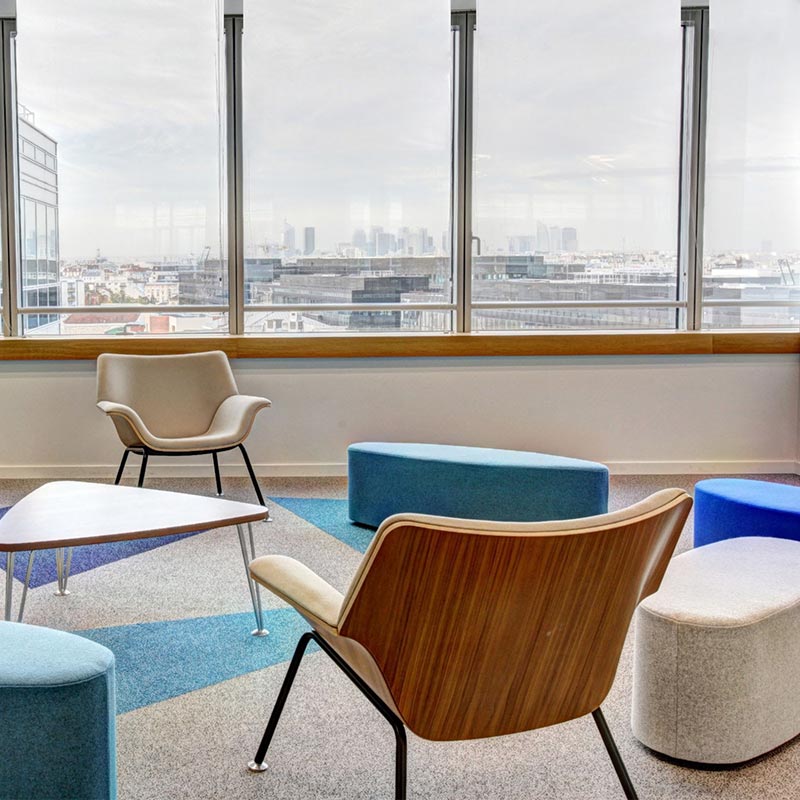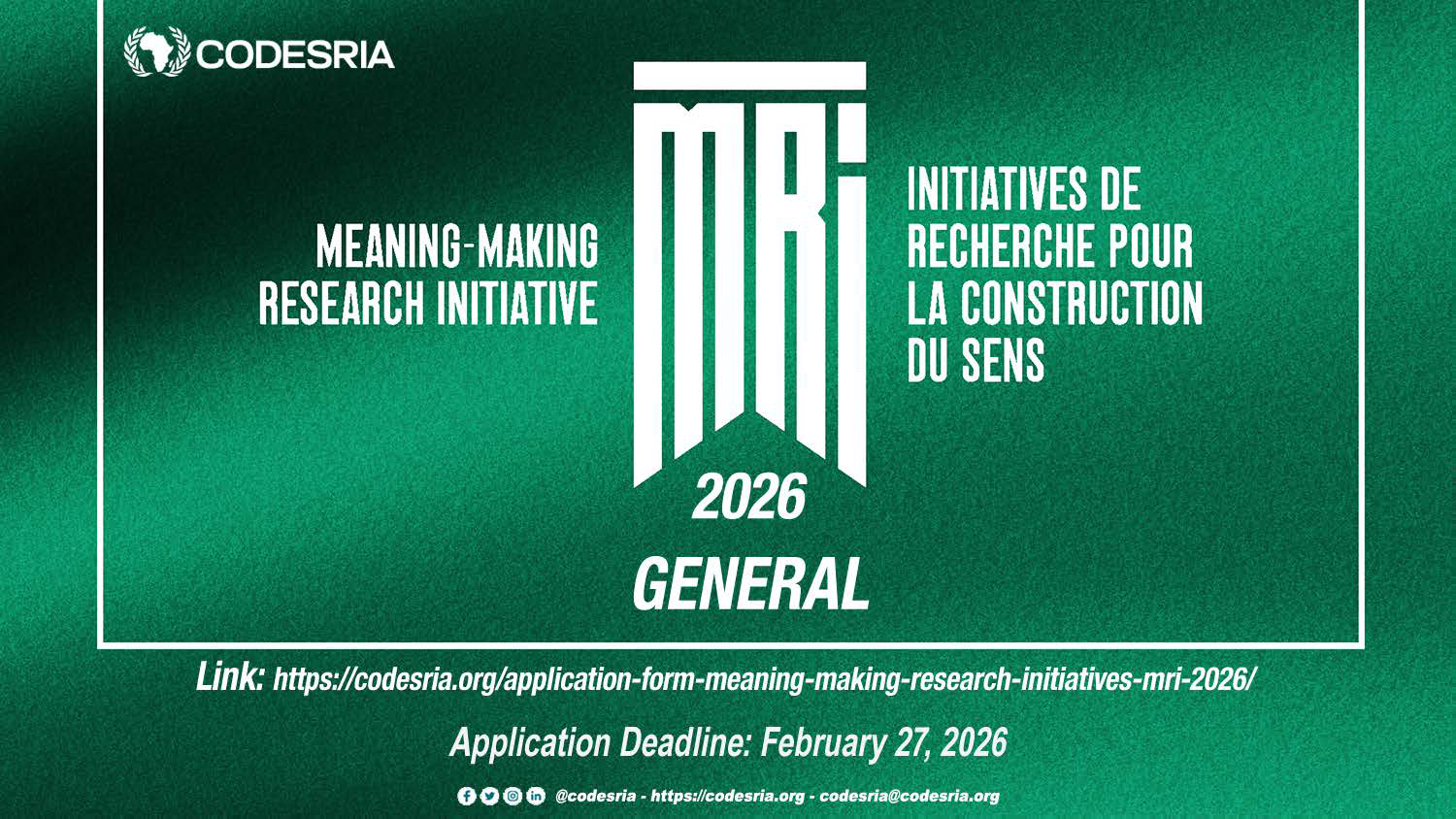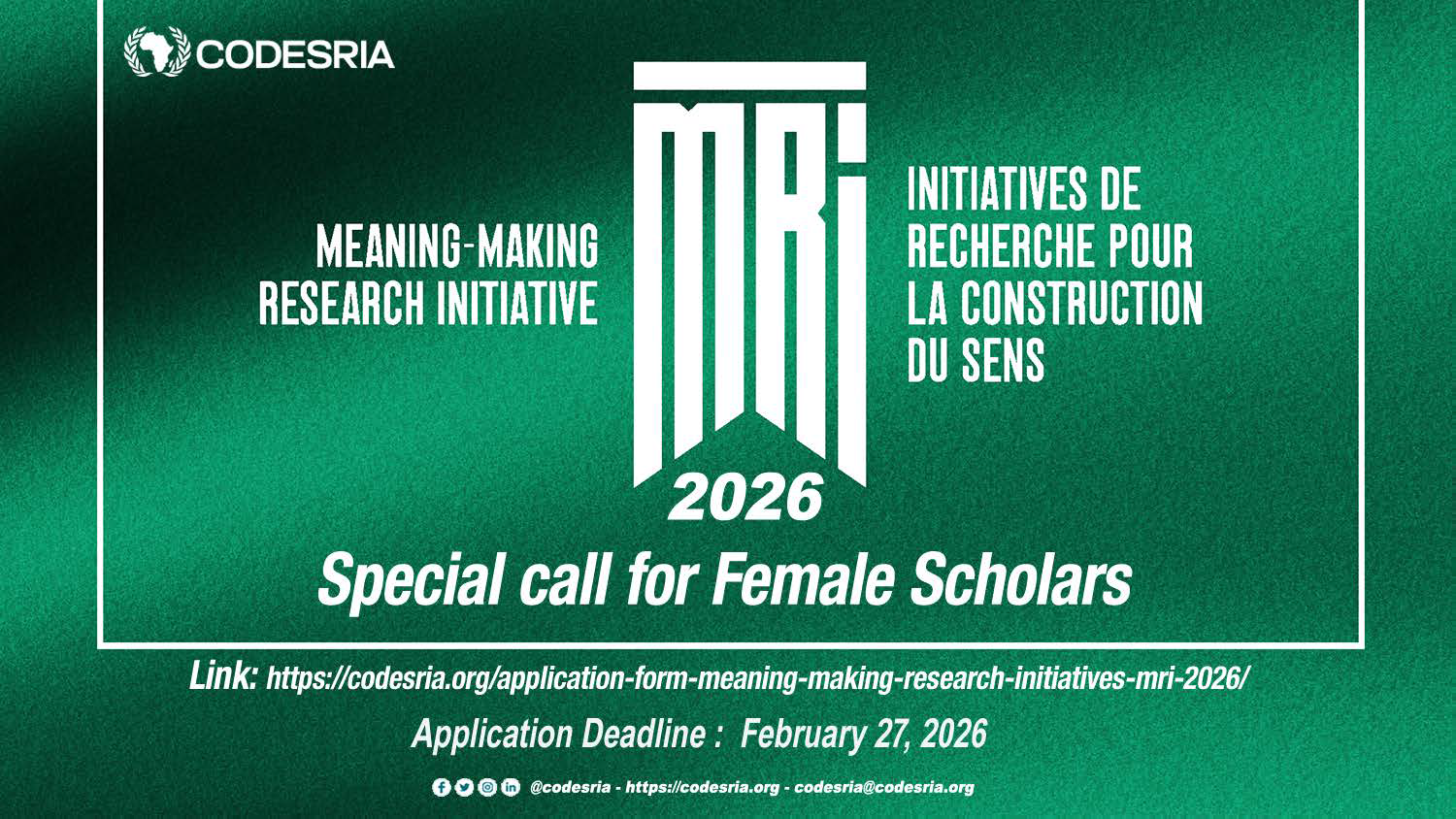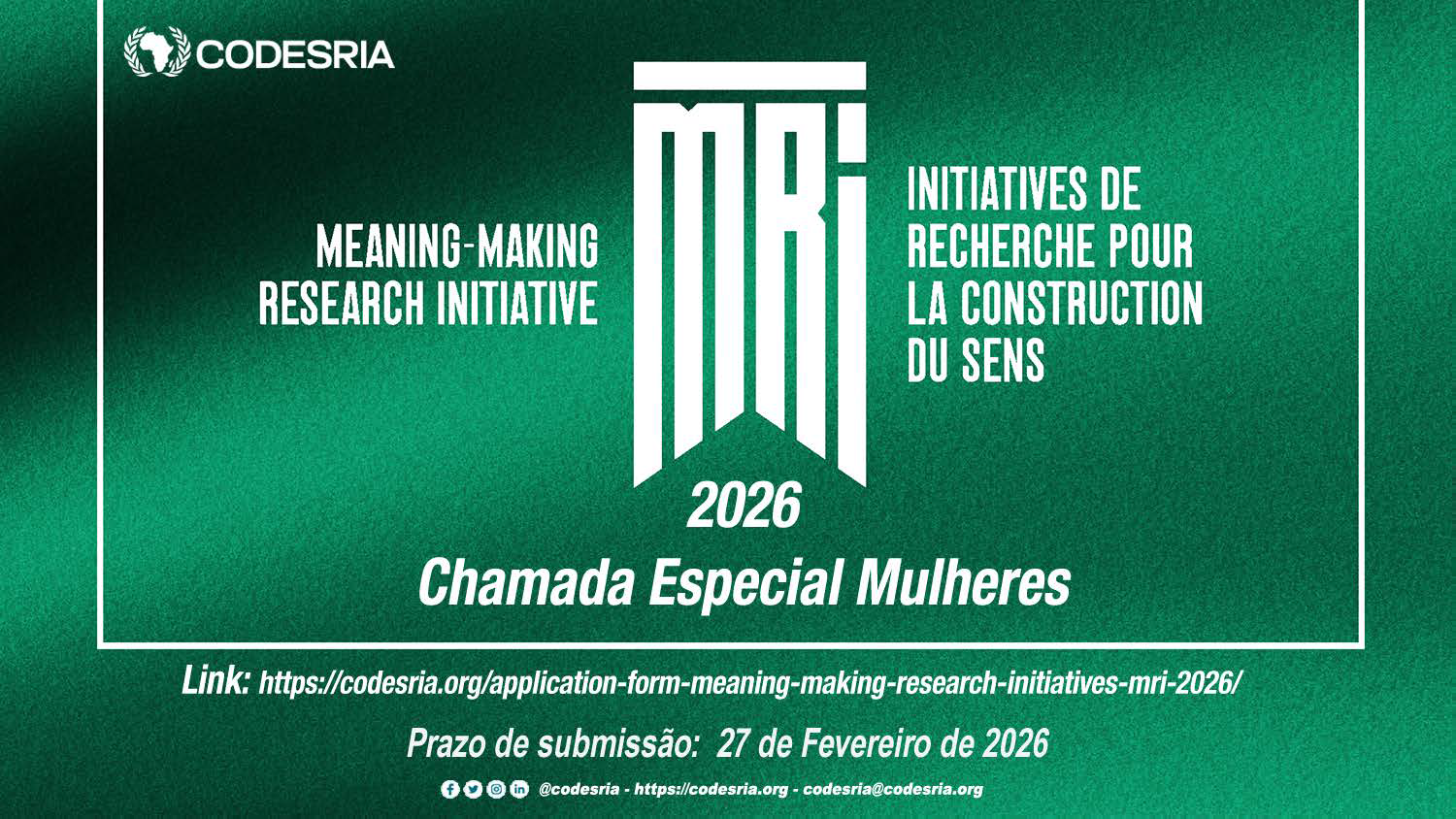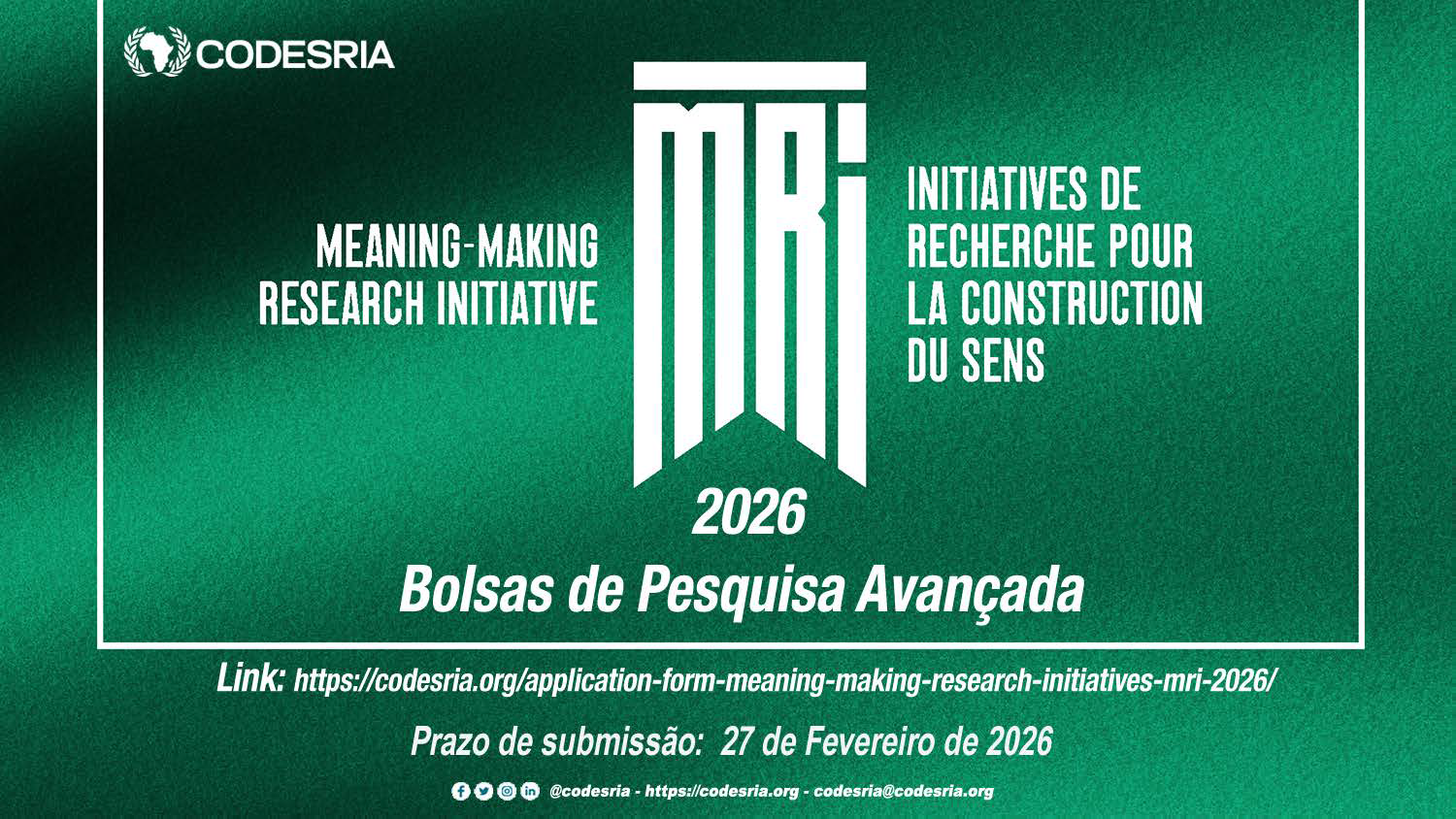CODESRIA 2017 DEMOCRATIC GOVERNANCE INSTITUTE: ECONOMIC GOVERNANCE AND AFRICA’S ECONOMIC TRANSFORMATION
Application Deadline: 31 July 2017
4 – 15 September 2017, Dakar, Senegal
The Council for the Development of Social Science Research in Africa (CODESRIA) is pleased to announce the call for submission of proposals from academics and researchers in African universities and Research Centers for the 2017 session of its annual Democratic Governance Institute. The institute will be held in the Council’s headquarters in Dakar, Senegal from 4 – 15 September 2017 on the theme “Economic Governance and Africa’s Economic Transformation’. The Democratic Governance Institute, launched in 1992 by CODESRIA, is an annual interdisciplinary forum which brings together about fifteen researchers from various parts of the continent and the Diaspora, as well as some non-African scholars engaged in innovative research on topics related to the general theme of governance.
Organization of the Institute
A scientific director who is a senior academic in the relevant discipline, with the support of selected resource persons will provide intellectual leadership and guide the laureates of the institute to engage with issues revolving around the selected theme. The director and resource persons will read and select laureates to the Institute based on the quality of proposals received; ensure that the laureates are exposed to a wide range of methodological and theoretical and policy issues related to the theme and assist the laureates develop their work to publishable standards. Each laureate is required to prepare a research paper to be presented during the session. The revised versions of such papers will undergo a peer review for publication by either by CODESRIA or partner publishing institutions. In collaboration with the Director and the Resource Persons, the CODESRIA Documentation and Information Centre (CODICE) will provide participants with a comprehensive bibliography on the theme of the Institute. Access to a number of documentation centers in and around Dakar will also be facilitated. English and French languages are used for communication during the Institute through simultaneous translation.
Theme for the 2017 Institute
In the past twelve months, the momentous changes in electoral politics in Britain and North America have reopened questions of the role of ideas in democratic participation. Challenging questions now emerge about the basic intellectual starting points for discussing democracy. It is in this context that the theme selected for the 2017 session of the Institute invites us to interrogate wider issues of democratic participation that are at the core of the economic realities facing most African countries. Governance issues in the past have focused at the continental level without sufficiently looking at the interconnections between the global governance of international organizations and their implications for Africa. Sitting at the core of the intersection between global governance of international organisations and Africa are pressing economic dynamics.
The dramatic events of the global system that started with the downturn of 2007/8 followed by the Eurozone crisis led to some commentators writing on systemic fragility in the global economy. One of the major limitations of this body of literature is that it continues to treat Africa as an afterthought. Further, the strengths and weaknesses of the African economic conditions are not usually factored into discussions about governance at the international level. Africa’s key strategic advantage however is that the shadow banking institutions that are at the core of the fragility of the international financial system are, comparatively, underdeveloped in Africa. Thus the tension between increasing consolidation of Africa’s place in the global economic system and the rising demands for greater democratization on the continent presents an opportunity for innovative reflections. It is plausible that the main challenge of intense capital flight is to enmesh Africa into the global financial architecture so that Africans will have little room for maneuver if they advance democratic participation in their societies.
An area where Africa’s play a critical role in the global economy is the resource extraction sector. After the resource boom of the 2000-2010 decade and the confidence attending to the ‘Africa rising’ narratives, a number of countries are experiencing deeper economic regression. Creative ways to support the extraction of resources have not kept pace with demands of Africans for an interrogation of the place of Africa in the global value chain. Fast and fleeting forms of extraction are now being implemented because appetite for Africa’s resources from external markets remains high and continues to grow. While useful provisions to counter the appetite for African resources exist, many intellectuals have not publicized the African Mining Vision of the African Union to reiterate demands for changing the structures of mining and African economies.
The entry of new players in Africa such as Brazil, Turkey, India, Russia and China has affected the focus on the EU, Japan and North America. In the context of the renewed demand for African minerals and genetic resources, a number of African countries borrowed heavily from China and from the ‘Eurobond’ market. Most of these borrowing were pegged on continued high commodity prices or discovery of new resources like oil, in other countries. In some cases, the prices tumbled leaving countries with heavy debt financing obligations. Some countries resorted to refinancing loan repayments through more borrowing. Others have opted for domestic borrowing in ways that has made domestic loans expensive for small businesses and constricted growth and job creation. Hence, the financial sector has now come in for greater scrutiny.
Another dimension to Africa’s link to the global financial architecture is the role of credit rating agencies that are subordinate to Wall Street and the city of London. Recent information of the complicity of the Bank of England in fixing the LIBOR rates has now ensured that African planners look beyond what is called ‘market’ forces in dealing with international borrowing agencies. The LIBOR scandal and the printing of money under the banner of Quantitative Easing (QE) in North America and Europe has made it abundantly clear that the political economy of international financial flows depends on the political strength of the contending forces.
The question of Quantitative Easing cannot be divorced from the high levels of capital flight from the emerging markets. After the publication of the Panama Papers it was reported that over US$21 trillion flow to offshore havens. African societies are integrated into this global illicit economy that has its base in QE and LIBOR fixing. The Report on Illicit Financial Flows from Africa will be a core area of study generally but also in this Institute. The aim is to further the technical skills and political connections to enable African scholars to elaborate on the financial flows. While initiatives have been taken to document these flows by the UNECA and the African Development Bank, intellectual centers in Africa lag behind in the documentation and tracking of these illicit flows and the corroding influence on democratic norms.
African intellectuals have made their contribution to the understanding of ‘governance’ and, in the process, offered a wider field of inquiry for this concept. Hence, the literature on economic governance or more generally governance with regard to Africa is diverse. Most of the literature looks at governance as the way different state and non-state actors make public decisions and manage economic and social resources for development. Good economic governance presupposes the existence and efficient functioning of market-supporting institutions such as property rights, financial regulatory institutions and institutions for macroeconomic stabilization. Yet, as the Report on the Illicit Financial Flows and the ‘Panama Papers’ attest, despite the existence of market supporting institutions, a confluence of international and national elites can effect ‘policy capture’ at the national level in ways that institutions are rendered inefficient. The consequence of this policy capture is the draining of foreign exchange reserves, reduced tax collection, canceling out of investment inflows and, in consequence, a worsening of the living conditions of many as poverty grows. Such outflows also undermine the rule of law, stifle trade and worsen macroeconomic conditions. In some instances, as pointed out in the Report on Illicit Financial Flows, some loans advanced to African countries are never received in African central banks. Such loans continue to be serviced from tax revenues while projects for which the loans were meant finance do not exist or exist in such debilitated state as to make the loans themselves useless. The distorting economic consequences of this will be explored in the Institute.
The theme of “Economic Governance and Africa’s Economic Transformation’ has been selected with the hope that laureates will have time to reflect in some depth on the contemporary economic trends in the continent and the kind of governance architecture required to insulate African economies from dangerous global economic networks.
Call for Resource Persons
Lectures to be delivered during the session are intended to offer laureates an opportunity to advance their reflections on the theme of the Institute. Resource persons should therefore be senior scholars or researchers who have published extensively on the theme, and who have significant contributions to make to the debates on it. They will be expected to produce lecture materials, which would stimulate laureates to engage in discussion and debate around their respective lectures and the general body of literature available on the theme.
Once selected, resource persons will be expected to:
♣ Interact with the Director of the Institute and the laureates to help the latter readjust their research questions and their methodological approaches;
♣ Submit a copy of their course materials for reproduction and distribution to participants no later than one week before they deliver their lectures;
♣ Deliver their lectures, participate in debates and comment on the research proposals and the papers of the laureates;
♣ Review and submit the revised version of their lecture notes or research papers for publication by CODESRIA not later than two months following their presentation at the Institute.
Call for Laureates
Applicants who wish to be considered as laureates should be PhD candidates or scholars in their early career with a proven capacity to conduct research on the theme of the Institute. Intellectuals active in the policy process and/or social movements and civil society organizations are also encouraged to apply. The number of places offered by CODESRIA at each session is limited to fifteen (15). Young African academics from the Diaspora and Non-African scholars who are able to fund their participation may also apply for a limited number of places.
Application for resource persons
Applications for the position of resource person should include:
1. An application letter;
2. A curriculum vitae;
3. Two (2) published papers
4. A proposal of not more than five (5) pages in length, outlining the issues to be covered in their three (3) proposed lectures, including one on methodological issues.
Applications for laureates
Applications for participation as laureate should include:
1. One duly completed application form;
2. An application letter;
3. A letter indicating institutional or organizational affiliation;
4. A curriculum vitae;
5. A research proposal not more than ten (10) pages including a descriptive analysis of the work the applicant intends to undertake, an outline of the theoretical interest of the topic chosen by the applicant, the relationship of the topic to the problematic and concerns of the theme of the 2017 Institute;
6. Two (2) reference letters from scholars or researchers known for their competence and expertise in the candidate’s research area (geographic and disciplinary), including their names, physical addresses, telephone numbers and email addresses;
7. A copy of the passport.
Applications Deadline
The deadline for the submission of applications is 31 July 2017.
Submission of Applications
All applications or requests for additional information should be sent electronically to:
CODESRIA
Democratic Governance Institute
P.O. Box 304, Dakar, CP 18524, Senegal
Tel. (221) 33 825 98 21/22/23
Email: gouvernance.institute@codesria.sn

